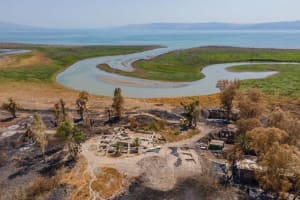Iran reportedly rebuilding missile sites destroyed by Israeli airstrikes during June war

The Iranian regime has begun the process of reconstructing key missile sites that were damaged by Israel during the war in June, according to the Associated Press. The assessment was made by missile experts who have analyzed satellite images of the key missile sites in Iran.
Sam Lair, research associate at the James Martin Center for Nonproliferation Studies, stressed that following the Israeli strikes, Tehran currently lacks large mixers, a key component for manufacturing solid fuel for missiles.
“If they’re able to reacquire some key things like planetary mixers, then that infrastructure is still there and ready to get rolling again,” Lair assessed after studying the key Iranian missile sites. Iran could potentially acquire these mixers from China, which has close commercial and diplomatic relations with Tehran.
Prior to Israel’s Operation Rising Lion military offensive against Iran, Tehran was believed to possess between 2,500 and 3,000 ballistic missiles that could reach Israel. During the 12-day war, Iran launched roughly 500 missiles at Israel, about 90% of which were intercepted by Israel’s multilayered air-defense systems. The Israeli Air Force further estimated that it destroyed some 1,000 Iranian missiles on the ground. If correct, the assessment suggests Tehran still retains about half of its pre-war missile arsenal.
Israeli Defense Minister Israel Katz warned in July that even with Iran's missile arsenal degraded, it still constituted a significant security threat to the State of Israel.
During the war in June, IDF Chief of Staff Lt.-Gen. Eyal Zamir explained that Israel needed to take military action to neutralize the security threat posed by Iran’s then-growing missile arsenal.
“Iran possessed around 2,500 surface-to-surface missiles, with a high production rate, such that within approximately two years, they were expected to possess around 8,000 missiles,” Zamir assessed.
Even after heavy losses, Iran’s missile arsenal remains its main offensive weapon. Israel has weakened Tehran’s proxy forces, while the U.S. and Israel have severely damaged its nuclear program. Iran’s air defenses have also been degraded, leaving its airspace vulnerable to future Israeli or American strikes.
The protracted negotiations between Iran and Western nations have focused almost exclusively on Tehran’s covert nuclear weapons program. The ayatollah regime has so far refused to negotiate the future of its missile arsenal, which remains its last viable offensive capability.
Carl Parkin, a summer fellow at the James Martin Center, assessed that prior to the June conflict, Iran was able to manufacture over 200 solid-fuel missiles per month.
“Israel’s targeting indicates that they believed mixing was a bottleneck in Iran’s missile production,” Parkin explained. “If Iran is able to overcome their mixing limitations, they’ll have all the casting capacity that they need to start producing at high volumes again.”
There are growing U.S. and Israeli concerns that China will actively provide Iran with enhanced missile capabilities.
“If Iran uses its relationship with China to bolster its disruptive military capabilities, the 12-day war could be a mere speed bump for the Iranian regime, rather than a decisive defeat,” Can Kasapoğlu, a senior fellow with the Washington-based Hudson Institute, warned.
However, it is unlikely that Israel will remain passive while Iran seeks to rebuild its missile capabilities. Israeli Prime Minister Benjamin Netanyahu recently hinted that he expects future military confrontations between Israel and Iran.
Given China’s dependence on Middle Eastern energy imports, it remains uncertain whether a renewed military clash between Iran and Israel would align with Beijing’s strategic interests.
The Iranian parliamentarian Mohsen Zanganeh recently claimed, “Two nights ago we tested one of the most advanced missiles in the country, which had not been tested until now, and it succeeded.” He added that “even under these circumstances, we are conducting a security test with an intercontinental missile.”
The missile test could not be independently confirmed.

The All Israel News Staff is a team of journalists in Israel.
You might also like to read this:

















